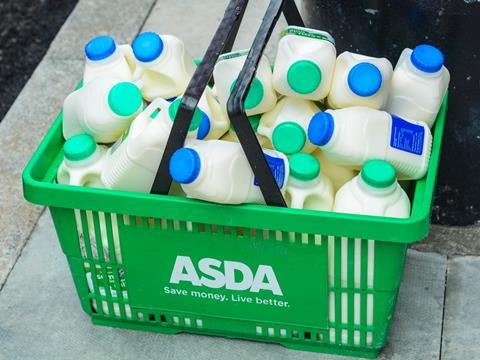
Asda has announced its decision to implement clear caps into its own-label fresh milk packaging – a move hoped to recycle 268 tonnes of rHDPE into new milk bottles and recycle 207 million plastic milk caps annually.
By transitioning into natural-coloured caps for its skimmed, semi-skimmed, whole, organic, and filtered milk products, Asda hopes that they can easily be recycled back into food-grade packaging. Each cap is set to contain 30% recycled material.
The switch will commence in Asda stores this month and is being undertaken in partnership with Arla. It will also affect Yeo Valley fresh milk, with a variety of coloured labelling differentiating between each product.
“At Asda, we are committed to finding ways to reduce our environmental impact,” said lead packaging strategy and innovation manager Fiona Dobson. “The introduction of clear caps on our milk bottles, is part of our wider commitment to drive 100% recyclability packaging and increase recycled content levels across all of our products by 2025.”
“As the UK’s largest dairy cooperative, we are committed to our climate journey at Arla and are focussed on reducing emissions throughout production, transport and logistics, packaging, and on farm,” continued Cartiona Mantle, head of Milk, Organic and Yogurt at Arla. “We are continuously exploring new ways to reduce our climate impact from our packaging material and are pleased to confirm we will be introducing clear caps across our milk portfolio from early June 2023, which will see nearly 1,000 tonnes of food grade plastic being retained in the circular system.
“Whilst our coloured caps are already recyclable and made of 30% recycled material (rHDPE), the switch to clear caps means the caps can be easily recycled back into food grade packaging.”
Jayne Paramor, strategic technical manager – Plastics, WRAP, added: “We applaud Asda on their decision to join the growing group of UK retailers who are removing pigments from their milk bottle caps. Clear, colourless plastics have much higher demand as recycled material, so removing pigments will help to produce valuable recycled plastics and build end markets for these reprocessed materials, ensuring that they find a second life as new products, including new milk bottles and lids.
“This small but impactful change is helping to make the UK’s milk bottles – which are already widely recycled into new milk bottles and a fantastic example of the circular economy for plastics in action – even more recyclable. An exemplary step in developing a circular economy for plastics.”
Waitrose exclusively partnered with Müller last year to trial clear caps for its HDPE own-brand milk bottles across its supermarkets. It made the permanent decision to replace the blue, green, and red caps last summer.
Later in the year, Co-op committed to eliminating its own coloured milk bottle caps to improve cap recyclability, having trialled the solution on semi-skimmed milk bottles in August.
If you liked this article, you might also enjoy:
McKinsey on whether or not on-pack sustainability claims affect consumer spending
A deep dive into the most important packaging sustainability trends and solutions














No comments yet